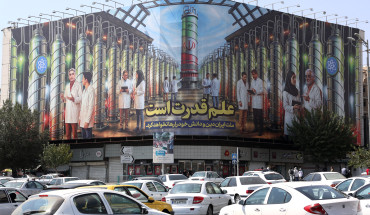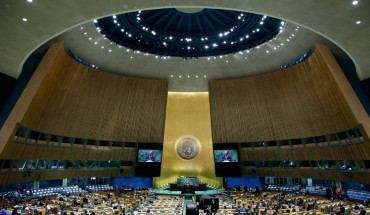
Full Event Summary:
Dr. Steven A. Cook, a Senior Fellow at the Council on Foreign Relations, moderated a panel discussion on issues pertaining to Turkey’s relations with Iran, Iraq and Israel. Speakers Cengiz Çandar, Karim Sadjadpour and The Honorable Robert Wexler addressed the nature and implications of Turkey’s economic and political relationships with these key Middle Eastern neighbors.
Speaking first, Cengiz Çandar, a columnist for the Turkish daily news publication Radikal, addressed Turkey’s relationship with Iraq and, in particular, Iraq’s autonomous Kurdish region in the North. He asserted that Turkey’s cooperation with all of Iraq has increased significantly due to a change in Turkey’s policy towards Iraqi Kurdistan, which shifted from being largely security-oriented to being heavily driven by economic interests. Many of these economic interests stem from Turkey’s energy consumption needs (Turkey consumes roughly 500,000 barrels of oil per year, much of which Turkey now imports from the oil-rich region of Northern Iraq). This growing energy relationship has led to broader gestures of amity and cooperation between Turkey and the Iraqi government, such as the opening of a Turkish consulate in Arbil and Kurdish President Massoud Barzani’s first visit to Turkey in 8 years.
Çandar also affirmed that Turkey’s increased economic engagement with Iraq has broader implications for Turkey’s overall influence in its neighborhood. Citing the fact that Turkey recently lifted visa requirements and signed free trade agreements with Syria, Lebonan and Jordan, he demonstrated how Turkey’s economic agenda has propelled it to a more powerful position in the region. This broadening engagement also reflects the multi-polarity of the current, post-Cold War geopolitical environment. Turkey has become a key actor on this multi-polar stage of global politics, however, not without a cost. Turkey’s increased regional cooperation has spurred conflicts of interest with the U.S., which now questions Turkey’s loyalty to the West. Nevertheless, as Çandar asserts, Turkey’s engagement in the Middle East should not be viewed within a simple East vs. West context. Rather, it should be viewed within the context of Turkey’s new, dynamic foreign policy, which aims to promote security, diplomacy, tolerance, economic interdependence, and high-level political dialogue within the region.
Following Cengiz Çandar’s remarks, the Honorable Robert Wexler, President of the S. Daniel Abraham Center for Middle East Peace, discussed Turkey’s volatile relationship with Israel. He asserted that the break down of diplomatic ties between these two countries is largely the result of hypocrisy and imprudence on the part of both nations’ leaders. In regard to Turkey, he explained that Prime Minister Recep Tayip Erdogan’s fiery rhetoric about Israel, as well as the AKP’s excessive warmth towards Iranian President Mahmoud Ahmedinejad, have caused not just concern in the West regarding Turkey's foreign policy orientation, but also strong resentment by Israel, who views Iran as a serious threat.

Furthermore, Turkey has held Israel to Hippocratic standards. While it refrains from condemning the Iranian or Sudanese leaders for their immoral behavior, it has been quick to use fiery language to condemn Israel for its conduct in the Gaza flotilla incident. Israel, for its part, has acted imprudently towards Turkey. Specifically, the intentional humiliation of Turkish Ambassador Ahmed Oguz Celikkol at a meeting with Israeli Foreign Minister Danny Ayalon in Jerusalem incited an extremely negative
reaction from Turkey. Wexler then asserted that these numerous transgressions, which have led to the breakdown in Turkish-Israeli relations, must be analyzed in terms of the tone that preceded them. Both the Turkish and the Israeli governments have perpetuated an environment of tension and animosity. Thus, Wexler concluded by stating that both governments need to learn from their mistakes and move on to address the plight of the families of the flotilla victims in a more diplomatic manner.
Speaking last, Karim Sadjadpour, a Fellow at the Carnegie Endowment for International Peace, discussed the growing relations between Turkey and Iran. He began by noting that Turkey has significantly increased its foreign investment in the Middle East in general during the past decade, which has led to concerns in the U.S. that Turkey is turning away from the West. Perhaps Turkey’s most notable regional engagement, however, has been its substantial economic cooperation with Iran. This cooperation has benefited Turkey financially, but it will likely have negative diplomatic repercussion as well. Sadjadpour asserted that, because most Arab nations strongly dislike Iran’s leaders, Turkey’s engagement with Iran may alienate T
urkey, not just from the U.S., but from the entire Arab world as well. Futhermore, the Turkish government’s Iran policy does not account for the opinion of the Turkish public, 60% of which has an unfavorable view of Iran and its president, Mahmoud Ahmadinejad. Thus, it seems there is a disconnect between the Turkish government’s Iran policies and the popular mood in Turkey.
Sadjadpour also pointed out the fact that Turkey’s foreign policies are viewed with greater scrutiny  because, as a democracy, it is held to higher moral standards than countries such as Russia or China. As Sadjadpour asserted, if China or Russia were to endorse a distrusted and immoral government like that of Iran, fewer red flags would be raised. However, when Turkey endorses such a government, this is viewed highly negatively and undermines the U.S.’s trust in Turkey’s ability to play a mediating role in the Iranian nuclear issue. However, he concluded by noting that while Turkey and Iran seem to have fostered a strong and amicable partnership thus far, their relationship will inevitably be limited by both countries’ desire to become the regional hegemon.
because, as a democracy, it is held to higher moral standards than countries such as Russia or China. As Sadjadpour asserted, if China or Russia were to endorse a distrusted and immoral government like that of Iran, fewer red flags would be raised. However, when Turkey endorses such a government, this is viewed highly negatively and undermines the U.S.’s trust in Turkey’s ability to play a mediating role in the Iranian nuclear issue. However, he concluded by noting that while Turkey and Iran seem to have fostered a strong and amicable partnership thus far, their relationship will inevitably be limited by both countries’ desire to become the regional hegemon.
Bios:
Dr. Steven A. Cook (Moderator) is Hasib J. Sabbagh senior fellow for Middle Eastern studies at the Council on Foreign Relations (CFR). He is an expert on Arab and Turkish politics as well as U.S.-Middle East policy. He has published widely in a variety of foreign policy journals, opinion magazines, and newspapers including Foreign Affairs, Foreign Policy, the Wall Street Journal, the Journal of Democracy, The Weekly Standard, Slate, The New Republic Online, the New York Times, the Washington Post, the Financial Times, and the International Herald Tribune. Dr. Cook is also a frequent commentator on radio and television. Prior to joining CFR, Dr. Cook was a research fellow at the Brookings Institution (2001–2002) and a Soref research fellow at the Washington Institute for Near East Policy (1995–96). Dr. Cook holds a BA in international studies from Vassar College, an MA in international relations from the Johns Hopkins School of Advanced International Studies, and both an MA and PhD in political science from the University of Pennsylvania.
Mr. Cengiz Çandar is a columnist for the Turkish daily Radikal. He has contributed as a columnist to different daily newspapers such as Yeni Safak and Referans and worked as a political analyst for the Haberturk television news channel. The author of seven books, he was an advisor to the late President Turgut Ozal on Middle Eastern issues from 1991 to 1993, a lecturer on Middle Eastern history and politics at Bilgi University in Istanbul from 1997 to 1999, a Public Policy Scholar at the Woodrow Wilson International Center for Scholars in 1999, and a Senior Fellow at the U.S. Institute of Peace in 2000. He has a Bachelor`s degree in Diplomacy and International Relations from Ankara University`s Faculty of Political Sciences.
Mr. Karim Sadjadpour is an associate at the Carnegie Endowment. He has worked as the chief Iran analyst at the International Crisis Group, working in both Washington and Tehran, focusing on the politics and foreign policy of the Islamic Republic. He has lectured at Harvard, Princeton, and Stanford Universities, and was named a Young Global Leader by the World Economic Forum ub Davos in 2007. He is a regular contributor to The Economist, The Washington Post, The New York Times, International Herald Tribune, and Foreign Policy, and has made regular appearances on BBC, CNN, PBS NewsHour, and Al-Jazeera.
The Honorable Robert Wexler served as the Democratic member of Congress for Florida’s19th district for 7 terms, before retiring from the House in January 2010. He has been an advocate of close US ties to Israel in and out of Congress, serving as Barrack Obama’s Middle East and Israel issues advisor in the 2008 presidential election. He is now the President of the S. Daniel Abraham Center for Middle East Peace.










